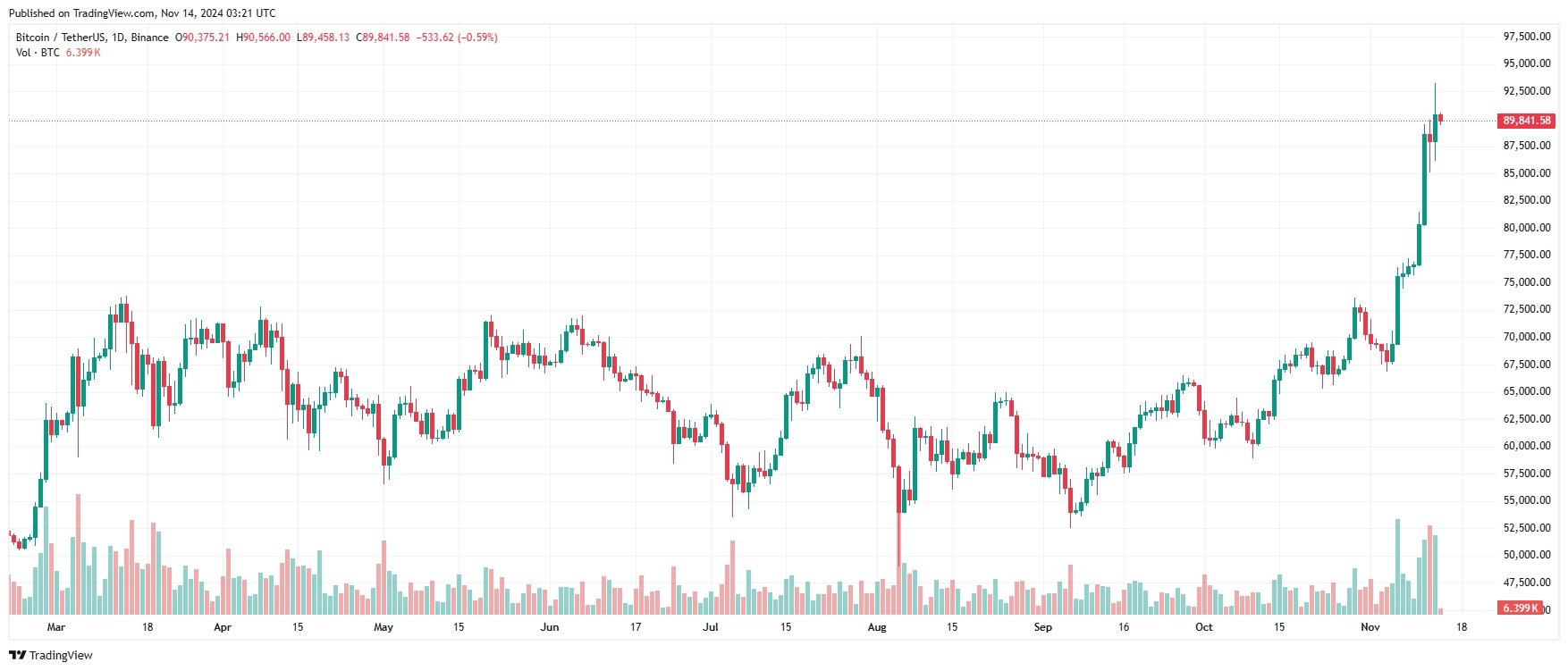
Bitcoin’s remarkable rise past $90,000 has not only captured headlines but also reignited conversations about its potential. What does this mean for the future?
The current Bitcoin surge surpasses its November 2021 high of $69,000 by approximately 30%, reflecting historical cycles often triggered by halving events. This trend suggests continued bullish momentum driven by political shifts and market sentiment.
Understanding this price surge is just the beginning. Let’s delve deeper into the historical patterns, political influences, and market dynamics that shape Bitcoin’s journey.
What Historical Patterns Can We Observe in Биткойн’s Price Surges?
Bitcoin’s recent leap past $90,000 sparks curiosity about its historical price patterns. What cycles have shaped its surges?
Bitcoin’s price surges are historically linked to four-year cycles influenced by halving events and market dynamics. These cycles often see rapid rises post-halving, marked by political and regulatory shifts, investor sentiment, and speculative behaviors.

Understanding Bitcoin’s Four-Year Cycles
Bitcoin’s price history is marked by distinct four-year cycles, closely tied to its halving events1. Halving occurs approximately every four years, reducing the reward for mining new blocks by half. This decrease in supply often precedes significant price surges as scarcity increases.
For instance, following the 2016 halving, Bitcoin’s price escalated dramatically, culminating in its infamous December 2017 high of nearly $20,000. A similar pattern was observed post-2020 halving, where Bitcoin soared to its previous peak of $69,000 in November 2021. These historical trends suggest that Bitcoin’s current rally past $90,000 could be part of this established cycle.
Political and Regulatory Influences
Political events can act as catalysts in Bitcoin’s price surges. For example, following Donald Trump’s election victory, optimism for cryptocurrency-friendly regulations spurred investor confidence. This sentiment was mirrored in Bitcoin’s ascent in 2023, driven by anticipation of policy changes under the new administration.
Such political dynamics create fertile ground for rallies by boosting market sentiment and attracting institutional investments, which can amplify price movements significantly.
Investor Sentiment and Speculation
Investor sentiment plays a crucial role in Bitcoin’s price fluctuations. The allure of substantial returns often draws retail investors into the market during bull runs, contributing to speculative trading behaviors. This can lead to sharp price increases followed by equally steep corrections.
Table: Historical Bitcoin Peaks and Their Triggers
| Year | Peak Price | Trigger Event | Remarks |
|---|---|---|---|
| 2013 | $1,150 | Increased Adoption | First major media coverage surge |
| 2017 | $19,783 | ICO Boom | Massive retail investor influx |
| 2021 | $69,000 | Post-Halving Rally | Institutional interest growth |
| 2023 | $90,000+ | Political Climate Shift | Regulatory optimism |
This table illustrates how various factors, including technological adoption and political shifts, have historically aligned with Bitcoin’s price surges.
By examining these patterns, investors can gain insights into the cyclical nature of Bitcoin’s market behavior. This understanding is crucial for navigating its volatile landscape and anticipating potential future movements.
How Do Political Events Influence Bitcoin’s Market Dynamics?
Political events can significantly sway Bitcoin’s market dynamics, impacting investor behavior and regulatory landscapes.
Political events influence Bitcoin’s market by shaping regulatory frameworks and investor sentiment. For example, elections may lead to policy changes impacting cryptocurrency adoption, while geopolitical tensions can drive demand as Bitcoin is viewed as a safe-haven asset.

The Impact of Elections on Bitcoin
Elections often introduce uncertainty and can lead to changes in regulatory policies affecting the cryptocurrency market. For instance, Donald Trump’s election2 victory brought optimism for a more favorable regulatory environment, as discussed in recent insights. This optimism often translates into increased investment in Bitcoin, as investors anticipate less restrictive government interventions.
Geopolitical Tensions as Catalysts
Geopolitical tensions, such as trade wars or military conflicts, can significantly influence Bitcoin’s market dynamics. In times of global uncertainty, investors may seek refuge in Bitcoin, considering it a safe-haven asset3. This behavior mirrors patterns seen in traditional markets where gold prices surge during geopolitical crises.
| Event Type | Market Influence | Example |
|---|---|---|
| Election | Regulatory optimism | Trump’s victory impacting crypto |
| Geopolitical Tension | Increased demand for safety | Rise in Bitcoin during trade wars |
Regulatory Developments
Political events often prompt changes in regulatory stances towards cryptocurrencies. New administrations may introduce legislation that either promotes or restricts Bitcoin usage. For instance, anticipated regulations under a new government can spur investor interest, aligning with previous cycles where clearer regulations led to increased institutional adoption.
Investor Sentiment and Political Stability
The stability of a political environment plays a crucial role in shaping investor sentiment towards Bitcoin. In politically stable regions, Bitcoin is often seen as an investment opportunity rather than a hedge against instability. However, in politically volatile areas, the cryptocurrency is viewed as a shield against potential financial turbulence.
Ultimately, the interplay between political events and Bitcoin’s market dynamics is complex and multifaceted. Understanding these influences can provide investors with valuable insights into potential market movements and opportunities for strategic investments.
What Role Does Investor Sentiment Play in the Current Rally?
Investor sentiment is a crucial factor in the current Bitcoin rally, influencing buying behaviors and market trends.
Investor sentiment, driven by optimism about institutional adoption and regulatory clarity, fuels Bitcoin’s current rally, impacting price movements and trading volumes.

The Power of Investor Sentiment
Investor sentiment significantly influences the cryptocurrency market, particularly Bitcoin. As a non-traditional asset, Bitcoin’s value is heavily swayed by collective investor emotions rather than purely economic fundamentals. When sentiment is positive, investors are more likely to buy, driving prices up. Conversely, negative sentiment can lead to sell-offs and price drops.
Factors Driving Positive Sentiment
- Institutional Adoption: Recent announcements from major financial institutions exploring Bitcoin investments have generated confidence. Investors believe that with institutions backing Bitcoin, its legitimacy and stability will improve, attracting even more capital.
- Regulatory Clarity: Clearer regulations under the current political administration are expected to reduce risks associated with Bitcoin investments. This has led to increased interest from both retail and institutional investors who previously hesitated due to regulatory uncertainties.
- Market Speculation: The psychological aspect of fear of missing out (FOMO) plays a crucial role as well. As Bitcoin prices rise, more investors jump in, hoping to capitalize on potential profits, further driving the rally.
Sentiment Indicators
To understand how sentiment influences the rally, we can look at various indicators:
| Indicator | Description |
|---|---|
| Google Trends | Measures search interest in Bitcoin, often rising with increased market activity. |
| Social Media Mentions | Tracks discussions on platforms like Twitter and Reddit, providing insights into public mood. |
| Cryptocurrency Fear & Greed Index | Analyzes emotions and sentiments from different sources to produce a single score. |
Potential Risks of Sentiment-Driven Markets
While positive sentiment can drive growth, it also introduces volatility. When market sentiment shifts rapidly due to external events or changes in perception, Bitcoin’s price can fluctuate dramatically. Understanding these dynamics is crucial for investors looking to navigate the market prudently.
For those interested in tracking sentiment, tools like Cryptocurrency Fear & Greed Index4 offer valuable insights into market conditions and can guide investment strategies.
Is the Current Bitcoin Price Surge Indicative of Future Trends?
Bitcoin’s price recently soared past $90,000, raising questions about its future trajectory. Could this be a sign of enduring trends?
The Bitcoin surge to over $90,000 aligns with historical cycles influenced by halving events and political shifts, indicating potential continued bullish trends. However, inherent volatility and speculative behaviors present risks, making future predictions complex.
Understanding Bitcoin’s Historical Cycles
Bitcoin’s price movements often follow distinct patterns known as cycles. Historically, these cycles are closely tied to halving events, which occur approximately every four years. During a halving event, the reward for mining new Bitcoin blocks is halved, effectively reducing the supply of new Bitcoins entering circulation. This scarcity has historically led to increased demand and price surges.
For instance, after the 2016 halving, Bitcoin saw a significant increase in price leading up to its then all-time high in December 2017. Similarly, the 2020 halving set the stage for the dramatic price rise observed in 2021. The current surge past $90,000 could be another reflection of this cyclical behavior, suggesting a potentially bullish trend driven by reduced supply and increased demand.
The Influence of Political Events
Political events have always had a profound impact on Bitcoin’s market dynamics. The recent surge coincides with a period of political change, notably influenced by Donald Trump’s election victory. This political shift has sparked optimism regarding cryptocurrency regulations, which could further boost institutional adoption and investor confidence.
Past market rallies have often coincided with regulatory clarity or political support for cryptocurrencies. For instance, during periods of regulatory uncertainty or adverse policies, Bitcoin’s price has typically experienced increased volatility. Conversely, favorable political climates can lead to sustained bullish trends, as seen in previous cycles.
Investor Sentiment and Market Dynamics
Investor sentiment plays a crucial role in driving Bitcoin’s price movements. The current rally has been fueled by expectations of greater institutional adoption and clearer regulations under the new administration. This optimism mirrors conditions from past rallies where positive sentiment led to increased capital inflows into the cryptocurrency market.
However, Bitcoin’s inherent volatility means that such rallies often attract speculative trading behaviors. Retail investors seeking quick profits can contribute to rapid price fluctuations, as witnessed in past cycles. This speculative nature introduces risks that must be considered when evaluating future trends.
The Complexities of Predicting Future Trends
While historical patterns provide insights into potential future trends, predicting Bitcoin’s exact trajectory remains complex due to its volatility and sensitivity to external factors. Analysts often use historical data to forecast potential outcomes, but it’s crucial to remain cautious and consider multiple perspectives.
| Factors Influencing Bitcoin Price | Potential Impact |
|---|---|
| Halving Events | Bullish due to reduced supply |
| Political Shifts | Can either boost or hinder market confidence |
| Investor Sentiment | Drives demand and market dynamics |
| Regulatory Environment | Determines institutional participation |
To navigate these uncertainties, investors must stay informed about Bitcoin’s historical cycles5 and closely monitor political developments6 affecting the cryptocurrency landscape.
Заключение
Bitcoin’s surge presents exciting opportunities but comes with inherent risks. Stay informed and strategic to navigate this dynamic landscape.
- Understand the impact of halving events on Bitcoin prices.: Crypto halving lasts for approximately four years. This event, known as Bitcoin halving, takes place every 210,000 blocks. The process will …
- Explore how Trump’s presidency influenced cryptocurrency regulations and market dynamics.: On Wednesday morning, almost all of the industry’s wishes came true. Republican candidate Donald Trump, who has lavished praise upon Bitcoin …
- Learn why Bitcoin is considered a safe-haven asset amid global uncertainties.: The world’s largest cryptocurrency is not a safe haven against geopolitical risks, the report said. “Gold is a geopolitical hedge,” wrote Geoff …
- Explore how sentiment indicators predict market trends effectively.: The Crypto Fear and Greed Index is a tool that gauges the market sentiment of cryptocurrencies, providing a score from 0 to 100. The index utilizes various …
- Learn about Bitcoin’s cyclical patterns and their market effects.: Historically, Bitcoin has followed a four-year cycle tied to Bitcoin halving events, which happen approximately every 4 years. A halving event marks a 50% cut …
- Discover how politics can shape cryptocurrency trends.: Crypto voters shape the 2024 election, influencing the new administration’s first 100-day plan for crypto regulations, financial inclusion …


